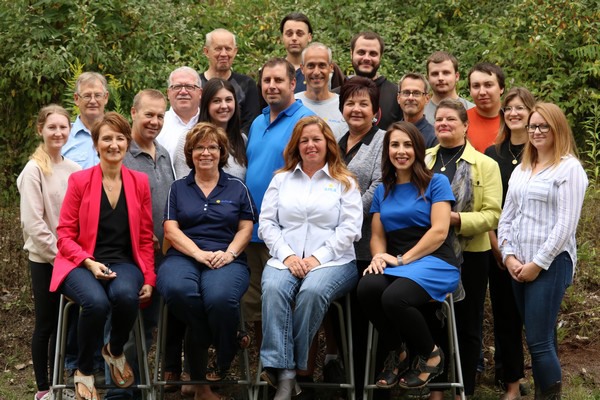A.M.A. Horticulture Inc. was founded in Kingsville, Ontario, Canada in 1982. Although Connie Bradt, daughter of company founder Allen Monsma, officially joined in ’96, she has been actively involved with horticulture and the family business for longer than she can remember. “I still have pictures of when I was little, I don’t think I could even walk yet, and I was planting chrysanthemums in the greenhouse with my parents.” Now, together with her husband Rick Bradt, they own and operate A.M.A.
Today, the  family run company serves the horticulture industry throughout North America, not just as a supplier, but as a solutions-based organization that aims to help growers find the ways and means to be more productive and innovative, setting them apart from other growers. They’ve been able to stand by their customers during the challenges that have come with COVID-19, and are very glad about that.
family run company serves the horticulture industry throughout North America, not just as a supplier, but as a solutions-based organization that aims to help growers find the ways and means to be more productive and innovative, setting them apart from other growers. They’ve been able to stand by their customers during the challenges that have come with COVID-19, and are very glad about that.
Working together during COVID-19
For growers in North America and around the world, the start of the COVID-19 crisis was very hard. “Early on when the pandemic hit North America, we started speaking with many of our customers and partners. We wanted to show them we were here for them as a friend and ready to help,” says Connie. “As we took more calls and learned more about how growers were responding to the crisis, we were able to share advice and tips from others in the industry to help everyone make it through.” A.M.A. was able to keep its doors open because they were identified as an essential part of the supply chain by government. Being ‘essential’ and having the ability to be there for growers was strong motivation for the A.M.A. team. “We became a place where people could come with their concerns. It was so much clearer that our role was to be a platform for brainstorming and problem solving. This has really cemented our conviction that we are a partner first, and an extension to our partners’ teams,” says Connie.
Collaboration and creativity in a post-COVID industry
A lot of growers, especially ornamental growers, did not have an easy pathway to market early this spring. But according to Connie, many were able to overcome this hurdle. “This industry is very inventive, creative and resilient, and many growers found new ways to get their products to the consumers.” Web shops popped up overnight, social media marketing skyrocketed and a lot of growers started ‘click and collect’ programs: you buy something online and get a time to drive up to the front door of the grower who then puts the product in the back of your car.
“People were still looking to purchase flowers and we started to see growers working together to meet that need,” says Connie. “Some of Canada’s provinces have always had the kind of collaborations that are forming now – people joining forces to find solutions for something that’s happening in their area. But during this pandemic, that feeling of collaboration has really expanded and, despite the challenges, the entrepreneurial spirit is inspiring.” The A.M.A. team hopes that the creative approach to marketing and collaborative partnerships will continue beyond the COVID-19 crisis. “That kind of thinking fosters innovation and sustainability.”
 The A.M.A. Horticulture team
The A.M.A. Horticulture team
Collaboration as an approach to sustainability
Sustainability is a subject on many grower’s minds, and A.M.A. takes a broad perspective on how to approach this important goal for long-term success. “There is a real desire for sustainable plastics and as we work toward that goal, different countries are setting different paces and have different regulatory policies in place. In North America, different recycling processes need to be established,” explains Connie. “One thing we can all do to move the needle on sustainability is take a more collaborative and holistic approach to the issue.”
Sustainability works best when it also benefits a grower’s bottom line. “We look at their whole set-up and needs and try to think about solutions that will reduce inputs in production and afterwards. This is win-win for the grower, and for the environment,” says Connie. She shares an example about the impact a simple change can make. “Hanging baskets on streets are something we all love in the summer, but they normally have to be watered every day. That’s a lot of wasted water, not to mention the water, trucking and labour costs,” she says. “We found a hanging basket that reduces the use of water by up to 50%. Municipalities go from watering every day or every other day to once every four days. That’s a huge impact!”
Finding sustainable solutions like this one depends on collaboration between suppliers and growers to get a full picture of how eco-friendly products can fit into grower’s systems. “COVID-19 has reinforced for us the importance of collaboration,” says Connie. “We aren’t just moving widgets from one door to the next. We’re supporting each other to get through real challenges and drive impactful innovations that can have lasting change on our industry.”
For more information: A.M.A. Horticulture
A.M.A. Horticulture
2011 Spinks Drive
Kingsville, ON N9Y 2E5
Canada
T: 519-322-1397 or 800-338-1136
F: 519-322-1358
[email protected]
www.amahort.com
